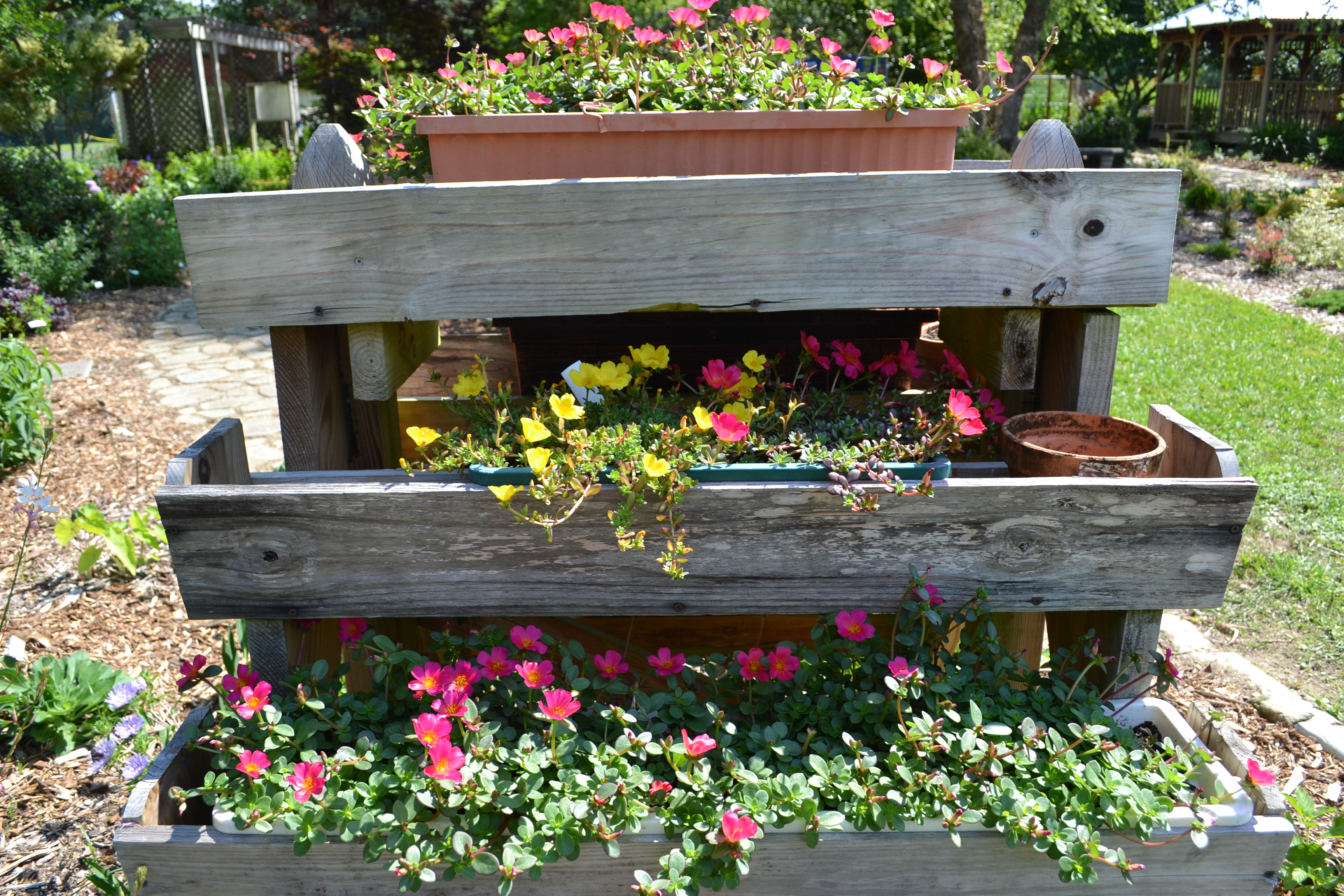
by Matt Lollar | Mar 4, 2021
Plant with Purpose: Written by Rachel Mathes
Last spring, we were all ready to host another Open House and Plant Sale on Mother’s Day weekend. When the realities of the pandemic became clear, we canceled the event for the safety of everyone involved. We typically have more than 500 visitors and dozens of volunteers on site. This year we are happy to announce we have adapted our annual fundraiser to a monthly learning and growing opportunity for the whole community.
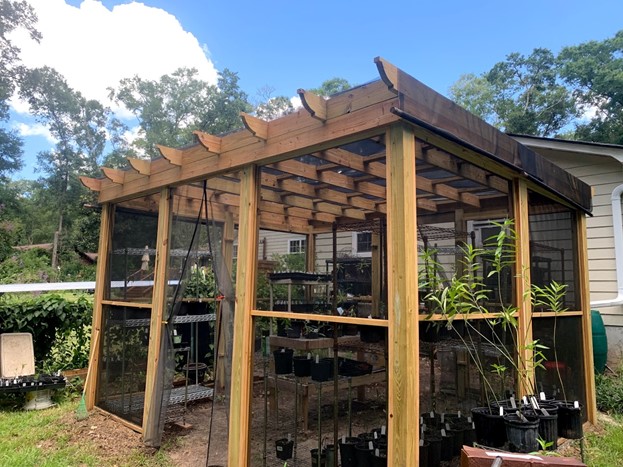
Master Gardener Volunteer Jeanne Breland is growing native milkweed in her monarch exclusion fortress for a Plant with Purpose talk and sale in the spring. Previous years’ milkweed have been eaten by monarch caterpillars before the sale so Jeanne has built her fortress to get the best results. Photo by Rachel Mathes
Our Master Gardener Volunteers will be teaching Thursday evening classes on particular plant groups throughout the year in our new series: Plant with Purpose. Topics will range from milkweed to shade plants to vegetables and herbs for different seasons. Attendees can attend the talks for free and grow along with us with the purchase of a box. These boxes are modeled after community supported agriculture (CSA) boxes you can purchase from local farms. Buyers will get a variety of the plants discussed in the plant lesson that week. For example, in our first event, Growing a Pizza Garden, we will have two tomato plants, two pepper plants, and one basil plant available for $20. Throughout the year, prices and number of plants will vary depending on the topic.
We hope with this new model of presentations and plant sales will enable us to remain Covid-safe while still bringing horticulture education to the community. Classes will be held on Thursday evenings from 6-7 pm via Zoom. Register on our Eventbrite to get the Zoom link emailed to you before each talk. Plant pick up will be the following Saturday from 10 am to noon. Master Gardener Volunteers will load up your plant box in a contact-free drive thru at the UF/IFAS Leon County Extension Office at 615 Paul Russell Rd.
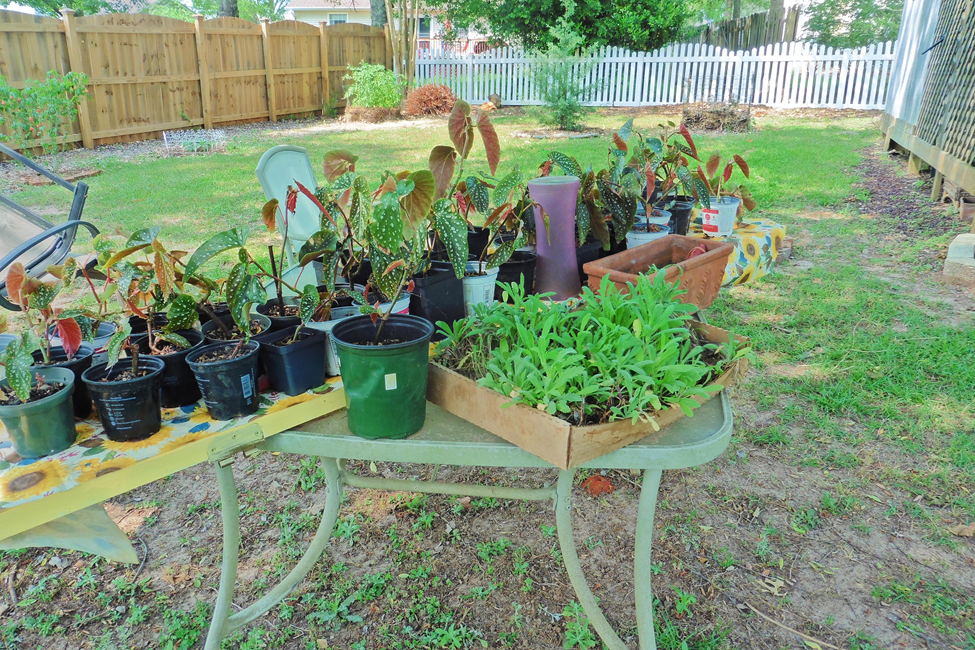
Propagation of angel wing begonia and other plants by Joan Peloso, Master Gardener Volunteer.
Master Gardener Volunteers are already growing plants for you to purchase throughout the year. Landscape plants, herbs, vegetables, shrubs and even trees will be available later in the year. Funds raised from this series help fund our Horticulture programming. Some notable programs that will benefit from Plant with Purpose include our Demonstration Garden, 4-H Horticulture Club, the Veterans’ Garden Group at the VA Tallahassee Outpatient Clinic, and various school gardens we help support throughout Leon County.
In the last year, we have adapted many of our programs to meet virtually, and even created new ones like our Wednesday Webinar series where we explore different horticulture topics twice a month with guest speakers from around the Panhandle. While we still can’t meet in person to get down in the dirt with all of our community programs, we hope that the Plant with Purpose series will help fill the hole left by our cancelled Open House and Plant Sale. Join us for the first installment of Plant with Purpose on Thursday March 18th from 6-7pm. Pick up for purchased plant boxes will be Saturday March 20th from 10am-noon.
To register for this event and other events at the Leon County Extension Office, please visit the Leon County Extension Office Events Registration Page.
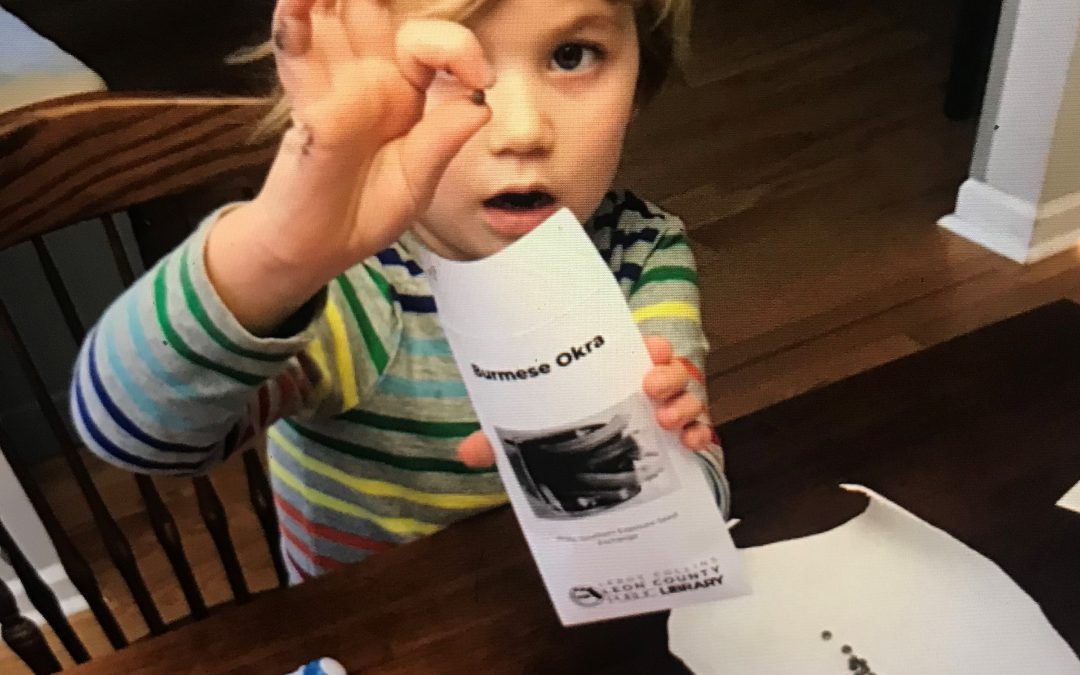
by Molly Jameson | Feb 11, 2021
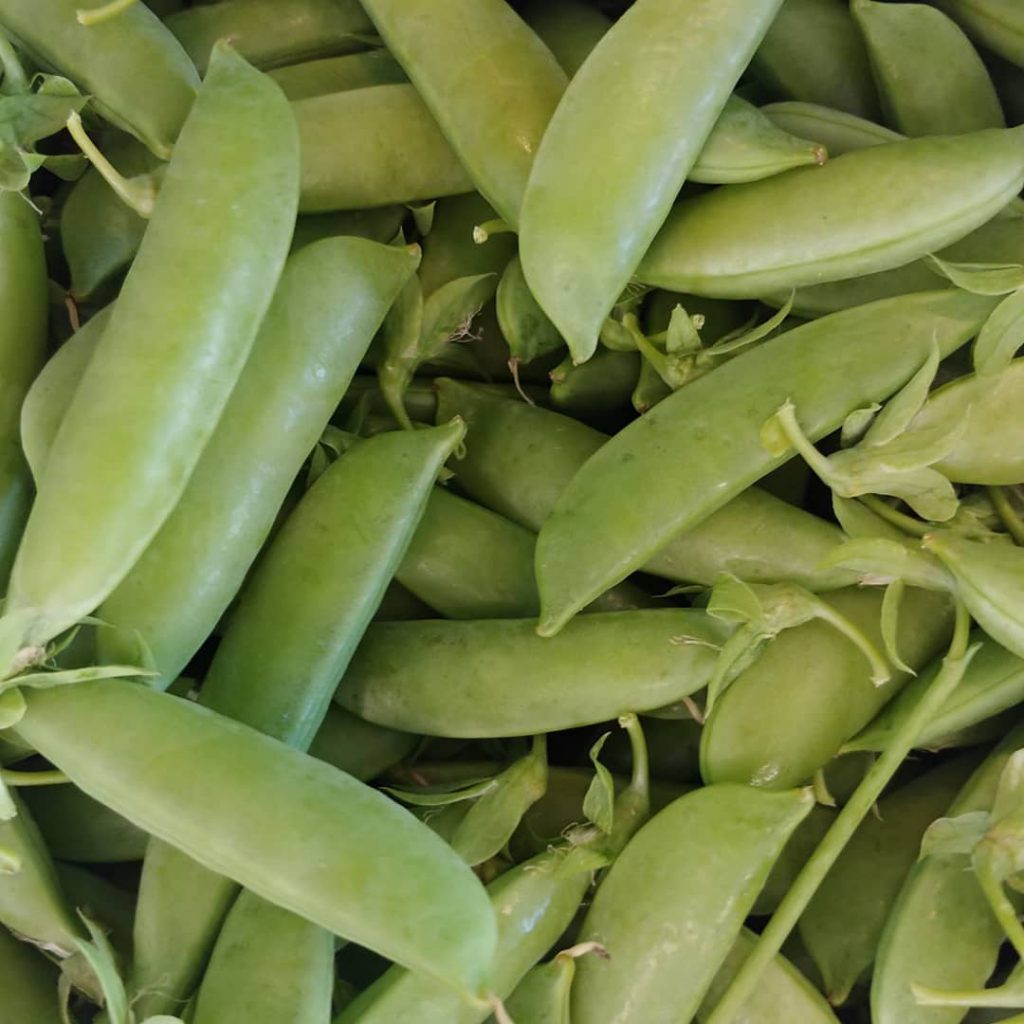
Sugar snap peas prefer to be planted when the soil is cool and the pods are delicious raw or cooked. Photo by Full Earth Farm.
Leon County’s Spring 2021 Seed Library Program Starts February 13
Although we are still experiencing the coolness of winter, the spring gardening season is right around the corner. To get a head start on the heat that will start taking over by May – and certainly by June – it is important to have a spring garden plan. If you want to start your veggies from seed, certain crops, such as tomatoes, need to be seeded soon for best results. Other warm-loving crops, like squash and cucumbers, also benefit from an early start to beat the life cycles of many common pests.
Need seeds to start your garden? Well, if you live in Leon County, you are in luck. Starting on February 13, 2021, residents of Leon County can “check out” up to three sample seed packets per month with their library card as part of Leon County’s Seed Library Program. The vegetable seeds can be checked out from any of the seven library branch locations. Leon County residents can apply for a library card online at the LeRoy Collins Leon County Public Library online card application page (https://lcpl.ent.sirsi.net/custom/web/registration/).
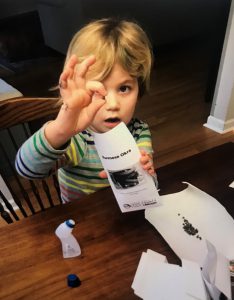
A young volunteer helped pack seeds from home for the Spring 2021 Leon County Seed Library Program. Photo by Jeanne Breland.
Here are the vegetable seed varieties that will be available starting February 13:
- Italian Large Leaf Basil. This is a fast-growing plant, with four-inch-long green leaves that have an anise flavor and a sweet aroma.
- Jackson Wonder Butterbeans. A high yielding heirloom, these beans produce pods with three to five reddish colored beans in each. When dried, the beans develop a mottled pattern.
- A & C Pickling Cucumber. Plants are productive, producing many straight, dark-green fruits that are great for pickling when they are four to six inches long. Eaten fresh, they can be grown out to 10 inches.
- Edisto 47 Melon. Plants prosper in hot, humid climates and produce mildly sweet five-pound cantaloupes in about 90 days.
- Burmese Okra. Plants have very large leaves and at about 18-inches tall, produce slender curved 9 to 12 inch okra pods that are virtually spineless. Under 10 inches, pods can be eaten raw and are less viscous than some other varieties.
- Sugar Snap Peas. Plants produce sweet, crisp pods that can be eaten raw or cooked. Seeds germinate well in cool soil and plant growth is vigorous, requiring support.
- Corno di Toro Sweet Bell Pepper. This productive pepper, whose name translates to “Horn of the Bull,” produces thick horn-shaped fruit that is flavorful and great eaten raw or cooked.
- Butternut Waltham Squash. This winter squash produces four-to-five-pound fruits with necks that are thick, straight, and cylindrical. The flesh of the fruit is smooth and has a flavor that sweetens with storage.
- Black Krim Tomato. This Russian heirloom has indeterminate growth and produces 8 to16 ounce, brown-to-red fruit with a deep smoky flavor. The shoulders of the tomatoes are brownish green and darken with more heat and sunlight.
- Matt’s Wild Cherry Tomato. This deep-red small cherry tomato has indeterminate growth and produces soft fruit that is very sweet and full of flavor.
Whether you are located in Leon County or not, everyone is welcome to join us Saturday, February 13, from 10:00 a.m. to 12:00 p.m., for our Leon County Seed Library Virtual Workshop. Via Zoom, agents with UF/IFAS Extension Leon County will discuss spring vegetable gardening techniques and food waste prevention. There will also be a live cooking demonstration showing how to prepare healthy meals and snacks at home, featuring vegetables available in the Spring 2021 Seed Library Program.
For more information about the Leon County Seed Library Virtual Workshop, please visit our Eventbrite page: https://spring2021leoncountyseedlibrary.eventbrite.com. There is no cost to attend the workshop, but registration is required.
Happy spring gardening!
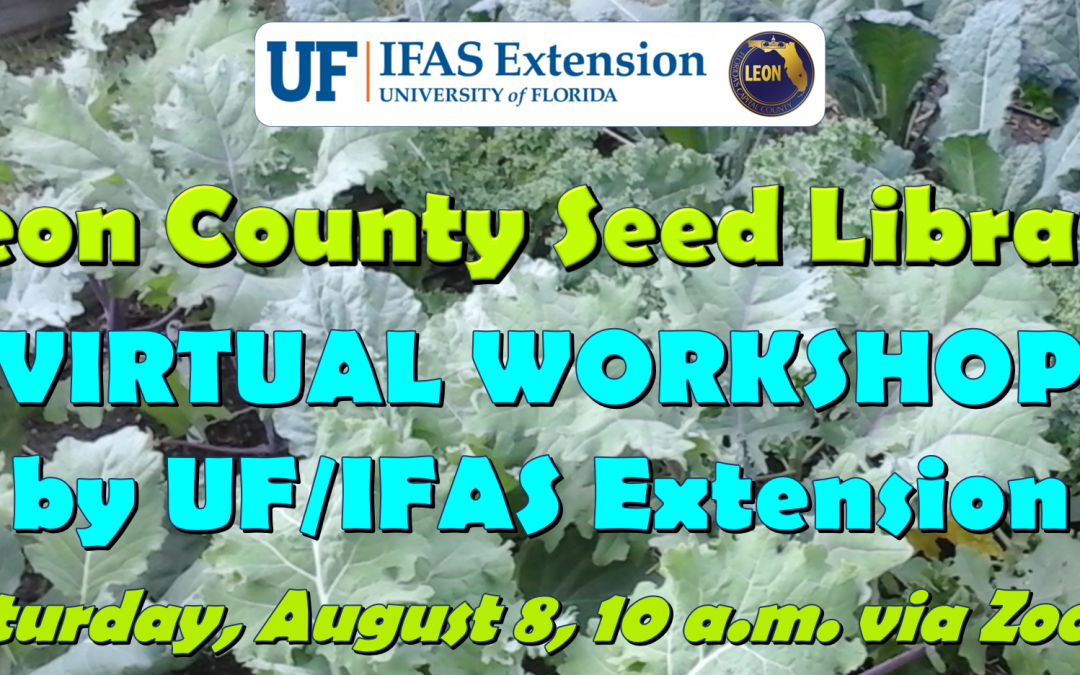
by Molly Jameson | Jul 23, 2020
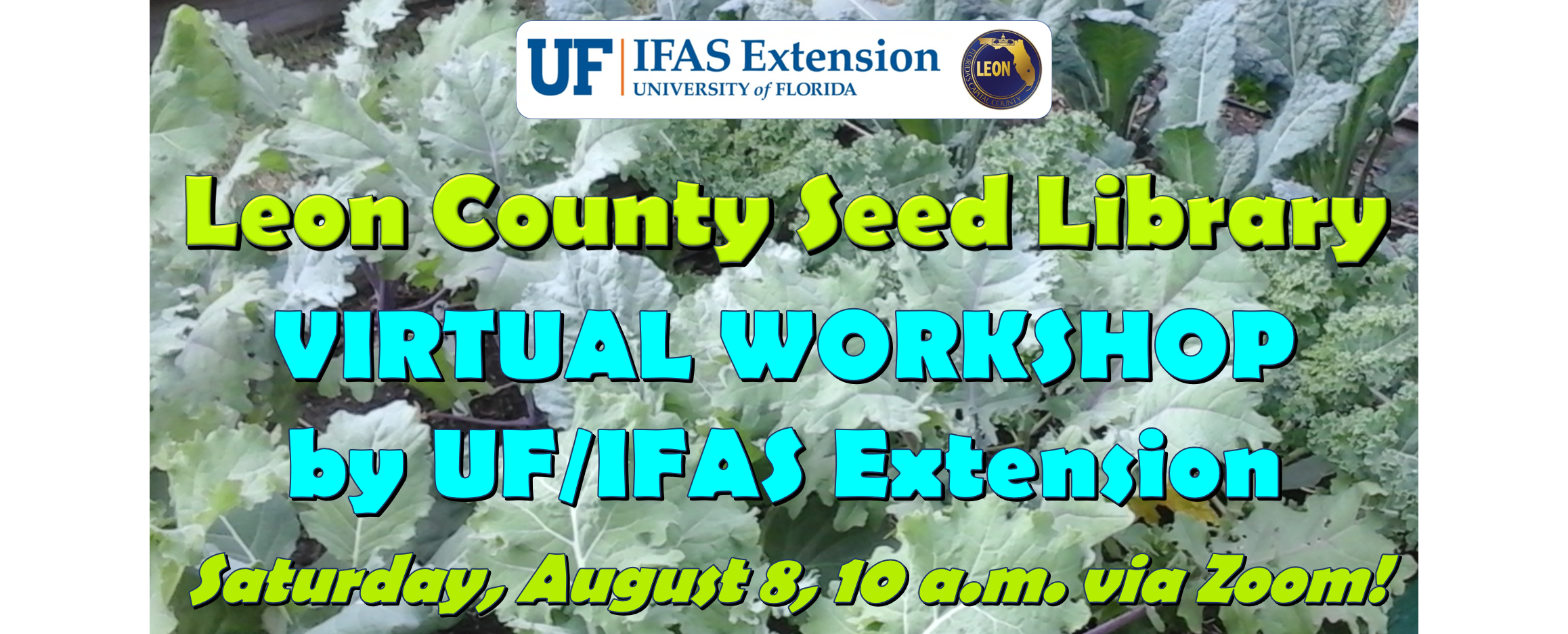
Join us via Zoom on Saturday, August 8, for our Leon County Seed Library Virtual Workshop. Graphic by Molly Jameson.
Leon County’s Seed Library Program Continues On
The COVID-19 pandemic has changed many aspects of our lives. In Extension, we have learned new ways to be innovative in our programs, and we have made adaptations to continue to reach the community through technology. While these technologies have allowed us the opportunity to connect with clientele and continue to allow important discussions related to the life sciences, there is no substitute for hands-on learning.
For this reason, I am thankful that the Leroy Collins Leon County Public Library System is proceeding with the Leon County Seed Library Program this fall. Since the spring of 2015, the Leon County Public Library has provided Leon County community members with sample vegetable seed packets to take home and plant in their gardens. While many aspects of the Seed Library Program will be altered this season, seeds will still be available to be “checked-out” from all Leon County library branches.
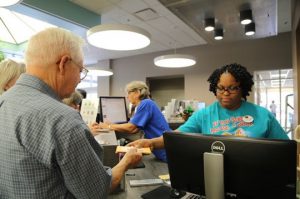
While face coverings and other safety precautions will be required, Leon County residents can still “check-out” seeds starting August 8. Photo by the Leon County Public Library.
As we continue to strive to keep ourselves and our community safe, many of us have used gardening as a way to relax and find some peace during these turbulent times. Planting vegetable seeds is a great way to learn about agriculture and our natural environment and gives us an opportunity to spend some time outdoors.
As an Extension Agent in Leon County, I have had the pleasure of partnering with the Leon County Library to help pick out the Seed Library Program seed selections, plan kickoff events, and provide hands-on workshops at various library branches. While “checking-out” seeds at the library this season will be a socially distanced activity, we still want to provide an opportunity for the community to engage with UF/IFAS Extension and learn about planting seeds, growing vegetables, and how to incorporate vegetables into snacks and meals to stay healthy.
Whether you are located in Leon County or not, everyone is welcome to join us Saturday, August 8, from 10:00 a.m. to 12:00 p.m., our Leon County Seed Library Virtual Workshop. Via Zoom, agents with UF/IFAS Extension Leon County will discuss vegetable gardening techniques and the importance of eating healthfully. We will also be doing a live virtual cooking demonstration featuring vegetables available in the Fall 2020 Seed Library Program.
For more information about the Leon County Seed Library Virtual Workshop, please visit our Eventbrite page: https://seedlibraryworkshop2020.eventbrite.com. There is no cost to attend the workshop, but registration is required.
If you are a resident of Leon County, all you need is your Leon County library card to check-out the vegetable seeds. Don’t have a library card? No problem! Leon County residents can apply online at the LeRoy Collins Leon County Public Library online card application page here: https://lcpl.ent.sirsi.net/custom/web/registration/.
Here is the list of the vegetable seeds that will be available starting August 8: Calabrese Broccoli, Cosmic Purple Carrots, Georgia Green Collards, Lacinato Kale, Buttercrunch Bibb Lettuce, Giant of Italy Parsley, Easter Egg Radishes, and Silverbeet Swiss Chard.
by Molly Jameson | Sep 16, 2019
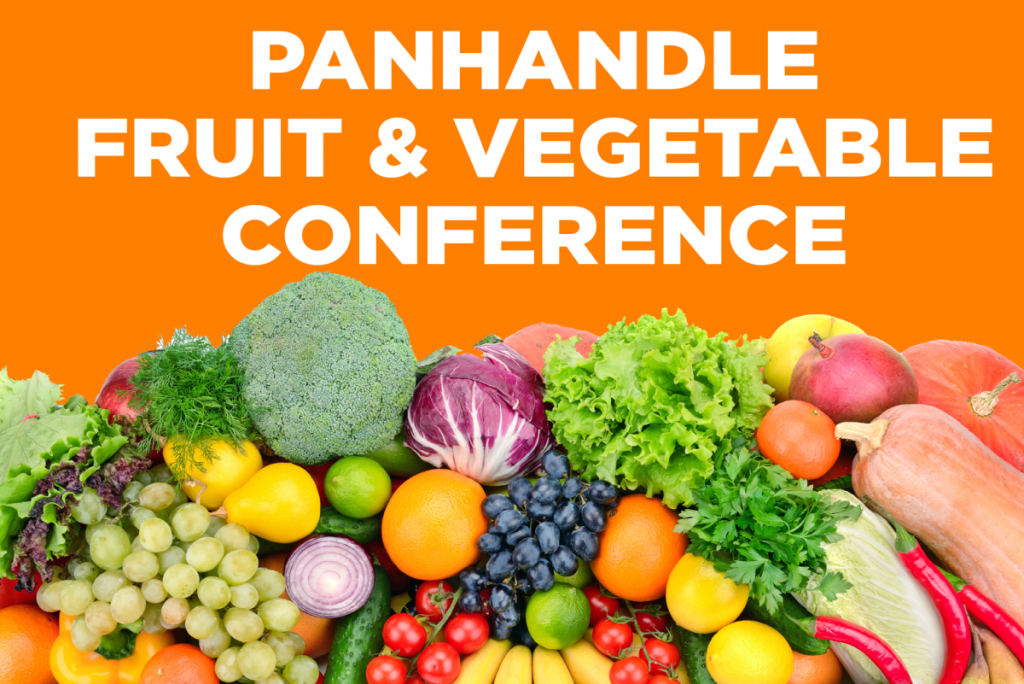
2019 Panhandle Fruit and Vegetable Conference: Seeking to Bridge the Agricultural Gap
Join UF/IFAS Extension on October 2 and 3 for the 2019 Panhandle Fruit and Vegetable Conference. Not only will participants get the opportunity to learn about some of the most current innovations in fruit, nut, and vegetable production; marketing and business; and alternative enterprises in the southeast; they will also have the pleasure of hearing the keynote address from Dr. Cary Rivard, an Associate Professor, Extension Specialist, and Director of the Kansas State Research and Extension Center.

The 2019 Panhandle Fruit and Vegetable Conference keynote speaker is Dr. Cary Rivard, an Associate Professor, Extension Specialist, and Director of the Kansas State Research and Extension Center.
Dr. Cary Rivard knows the horticultural and agricultural industries well, as he grew up helping his parents operate a greenhouse business in Kansas City, Missouri. Embracing his family roots, he received his Bachelor of Science degree in agricultural science and biology from Truman State University and his Master of Science and doctorate degrees in plant pathology from North Carolina State University.
But Dr. Rivard knows not everyone gets to grow up witnessing the importance of the agricultural industry firsthand, nor does everyone study agricultural sciences in pursuit of educational degrees. Therefore, throughout Dr. Rivard’s career, he has sought projects that work to connect urban communities with agriculture. As we all know, technological innovations in the 21st century have connected communities in more ways than we could have ever imagined. Yet, it seems a disconnect has arisen among the people in these communities and the food they eat and the farmers who grow that food. But Dr. Rivard sees this disconnect as opportunity. He knows it is agricultural and horticultural leaders – both university specialists and farmers – who can bridge the gap between urban communities and the agricultural products on which they, knowingly or unknowingly, truly rely.
At the Panhandle Fruit and Vegetable Conference, Dr. Rivard will discuss his mission to connect urban communities and agriculture, including his work coordinating the Growing Growers Kansas City program, which provides education to new and experienced growers through farm apprenticeships and an annual workshop series. In addition to speaking as the 2019 Panhandle Fruit and Vegetable Conference keynote speaker, Dr. Rivard will also present one of the conference sessions, where he will discuss his effort to integrate crop diversity and crop rotations into high tunnel production systems.
Register to attend the UF/IFAS Extension 2019 Panhandle Fruit and Vegetable Conference and Post-Conference Tour on Eventbrite (https://panhandlefv2019.eventbrite.com). The main conference will be held on October 2 at the Emerald Coast Convention Center in Fort Walton Beach, Florida. The post-conference tour on October 3 will be a great chance to chat with farmers, and it kicks-off with breakfast at the Emerald Coast Convention Center. Participants will then ride together by bus to tour local farms, enjoy lunch, and be returned to the Convention Center by 3 p.m.
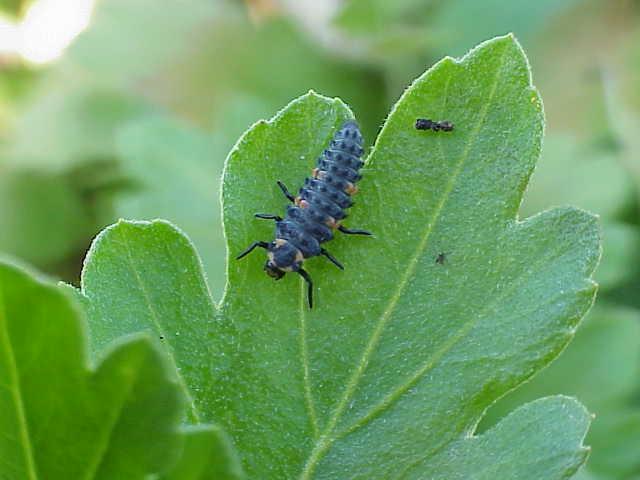
by Matt Lollar | Apr 9, 2019
The UF/IFAS Extension and FAMU will be bringing the Florida Pest Management Conference to Milton on April 17th. Attend to earn CEUs for your PCO License. Attendance is free and we are currently seeking sponsors at $80 per sponsoring business/organization. For more details and to register, please visit the conference webpage at Northwest Pest Management Conference.
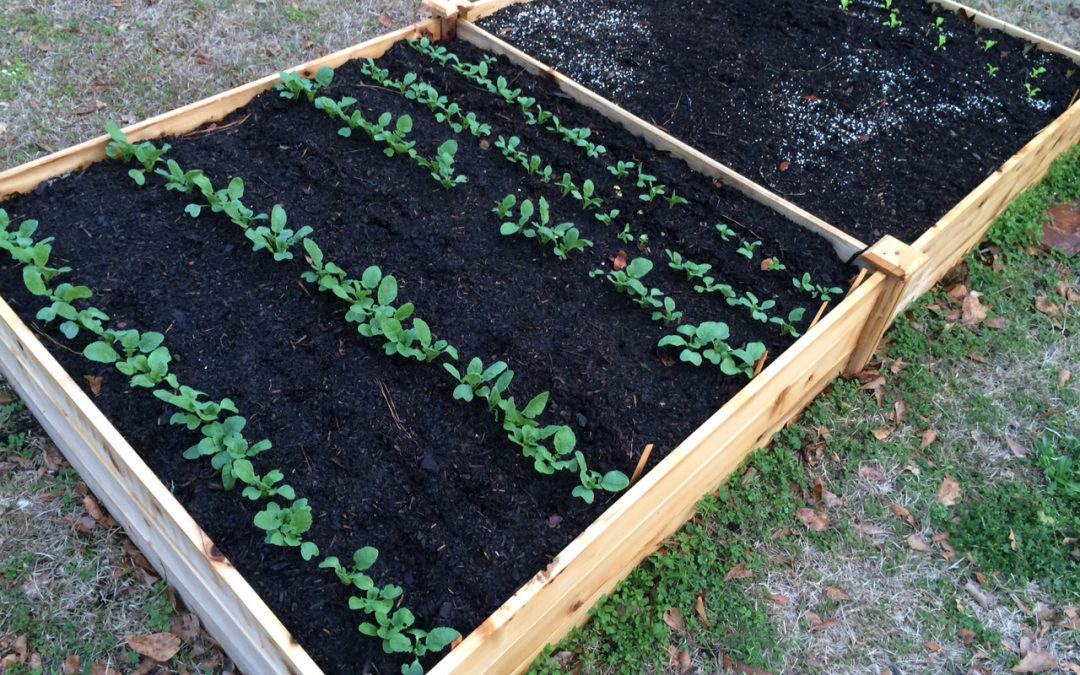
by Molly Jameson | Jan 14, 2019
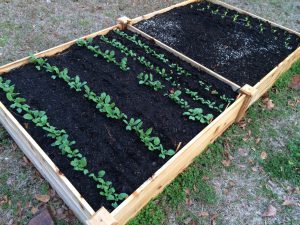
Raised beds are an excellent way to get started with gardening. Photo by Molly Jameson.
One of the biggest obstacles a vegetable gardener faces is how to supply crops with healthy soil that can support crop growth all season long. Many native soils in Florida are stripped of imperative nutrients that crops need to grow, are too compacted from vehicle and foot traffic, and are often too sandy to support soil life, which is very important for nutrient cycling, building soil structure, and combating pests and diseases.
One of the best ways a gardener can ensure a successful gardening experience is to build a raised bed garden. No matter your native soil type and existing conditions, raised bed gardens allow a framework for building nutrient rich soil that can supply crops with what they require to grow healthily and thrive.
Want to learn how to garden using raised beds? On February 5, from 6:00 to 7:30 p.m., UF/IFAS Extension Leon County is offering a Raised Bed Gardening 101 workshop as part of the Red Hills Small Farm Alliance’s Seven Days of Local Delights. This is a week-long annual celebration that includes educational workshops, restaurant partnerships, fundraisers, and more that supports the local food community and farmers in the Red Hills Region. This year, the Seven Days of Local Delights runs from Sunday, February 3 to Sunday, February 10.
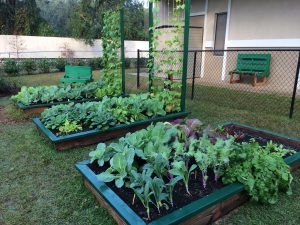
A trellis can even be built right on the end of a raised bed. Photo by Molly Jameson.
At the Raised Bed Gardening 101 workshop, learn how to choose the best raised bed garden site location, basics of irrigation in raised beds, planting dates and plant spacing, the difference between treated and untreated lumber, how much and what type of soil to use, and other tips on growing food in your backyard.
There is no cost to attend, but please register on Eventbrite (https://sdldraisedbedgardening101.eventbrite.com). For more information, contact Molly Jameson at mjameson@ufl.edu.
Check out everything going on during the Seven Days of Local Delights at the Red Hills Small Farm Alliance website: https://www.redhillsfarmalliance.com/seven-days. If you are not in the Tallahassee area, check with your local extension office to see what gardening events they may have available and how you can support your local food community and farmers in your area.















